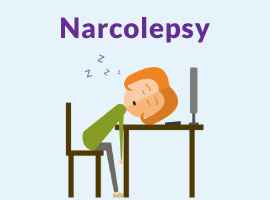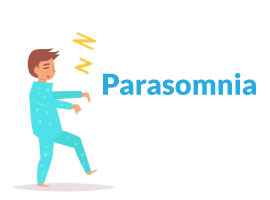Insomnia refers to a sleep disorder characterized by difficulties in falling asleep, staying asleep, or experiencing poor sleep quality despite having the opportunity to get adequate sleep. People with insomnia may have trouble initiating sleep, wake up frequently during the night, or wake up too early and find it difficult to return to sleep. As a result, they often feel tired, irritable, and may experience difficulties in concentrating during the day.
Types of insomnia
Insomnia is a sleep disorder characterized by difficulty falling asleep, staying asleep, or experiencing non-restorative sleep. It can be classified into different types based on various criteria. Here are some common types of insomnia:
1. Acute Insomnia: This type of insomnia is short-term and often occurs due to a specific event or stressor. It usually lasts for a few nights or weeks and resolves once the triggering factor is removed or managed.
2. Chronic Insomnia: Chronic insomnia refers to long-term sleep problems that occur at least three nights a week for a duration of three months or more. It can be caused by underlying medical conditions, psychological factors, or poor sleep habits.
3. Onset Insomnia: Onset insomnia is characterized by difficulty falling asleep at the beginning of the night. People with this type of insomnia may spend a significant amount of time in bed before they are able to fall asleep.
4. Maintenance Insomnia: Maintenance insomnia involves difficulty staying asleep throughout the night. Individuals with this type of insomnia often wake up during the night and have trouble getting back to sleep.
5. Comorbid Insomnia: Comorbid insomnia occurs alongside another medical or psychological condition. For example, it can be seen in conjunction with conditions like depression, anxiety, chronic pain, or substance abuse.
6. Psychophysiological Insomnia: This type of insomnia is often triggered by excessive worry about sleep itself. People with psychophysiological insomnia become overly focused on their inability to sleep, leading to anxiety and tension that further impede their ability to fall asleep.
7. Paradoxical Insomnia (Sleep State Misperception): Also known as "pseudo-insomnia," individuals with paradoxical insomnia believe they are sleeping poorly, but objective measures (such as polysomnography) show that they are actually sleeping more than they perceive.
8. Idiopathic Insomnia: Idiopathic insomnia is a rare type of insomnia that typically begins in childhood and continues into adulthood. It's thought to have a genetic basis and is characterized by an ongoing, lifelong difficulty with sleep initiation.
9. Environmental Insomnia: Environmental factors, such as noise, light, temperature, and uncomfortable sleeping conditions, can contribute to this type of insomnia.
10. Shift Work Insomnia: This type of insomnia is common among people who work non-traditional hours, such as night shifts or rotating shifts. The disruption of the body's natural circadian rhythms can lead to sleep difficulties.
11. Jet Lag Insomnia: Jet lag occurs when a person's internal body clock is out of sync with the local time after travelling across multiple time zones. This can lead to difficulties falling asleep and staying asleep in the new time zone.
12. Medical or Medication-Induced Insomnia: Certain medical conditions, such as asthma, acid reflux, and chronic pain,
Insomnia Causes
Insomnia is a sleep disorder that can have various causes, both psychological and physical. It's characterized by difficulty falling asleep, staying asleep, or experiencing non-restorative sleep, which can lead to daytime fatigue, irritability, difficulty concentrating, and other negative effects on overall well-being. Some potential causes of insomnia include:
1. Stress and Anxiety: High levels of stress, anxiety, or worry can make it difficult to relax and fall asleep. Racing thoughts and emotional turmoil can keep the mind active at night.
2. Depression: Depression is often linked to disrupted sleep patterns. Some individuals may experience early waking, difficulty falling asleep, or waking up multiple times during the night.
3. Poor Sleep Hygiene: Certain lifestyle habits can contribute to insomnia, such as irregular sleep schedules, consuming caffeine or heavy meals close to bedtime, and excessive use of electronic devices before sleep.
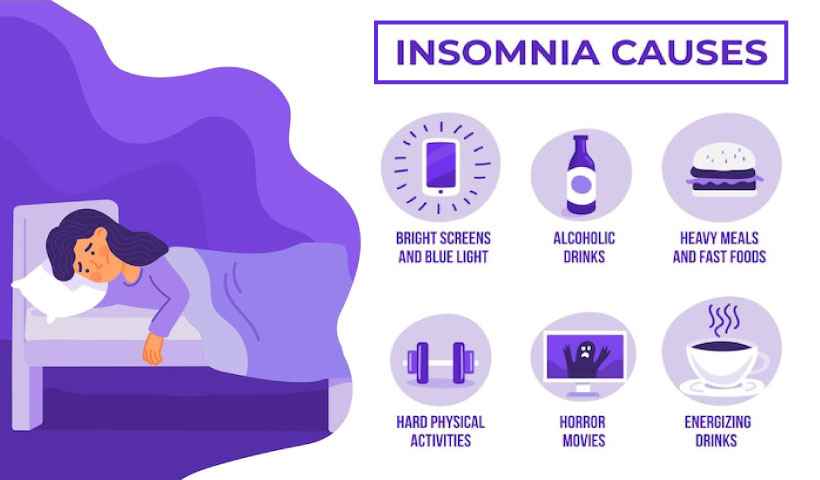
4. Medical Conditions: Conditions such as chronic pain (e.g., arthritis), respiratory issues (e.g., asthma), neurological disorders (e.g., Parkinson's disease), and hormonal imbalances (e.g., thyroid problems) can interfere with sleep.
5. Medications: Some medications, including certain antidepressants, asthma medications, and medications containing stimulants, can disrupt sleep patterns.
6. Substance Use: The use of alcohol, nicotine, and certain recreational drugs can interfere with the body's natural sleep processes.
7. Shift Work: Irregular work schedules, particularly those involving night shifts or rotating shifts, can disrupt the body's internal clock and lead to insomnia.
8. Age: Insomnia can be more common in older adults, possibly due to changes in sleep patterns and other health conditions.
9. Jet Lag: Rapid travel across time zones can disrupt the body's circadian rhythm, leading to temporary insomnia until the body adjusts to the new time zone.
10. Environmental Factors: Noise, light, temperature, and comfort of the sleep environment can affect the quality of sleep.
11. Sleep Disorders: Conditions like sleep apnea, restless legs syndrome, and narcolepsy can contribute to insomnia by interrupting normal sleep patterns.
12. Cognitive Hyperarousal: This is a concept where excessive worrying about not being able to sleep can actually create a cycle of anxiety that further disrupts sleep.
Insomnia Symptoms
Symptoms of insomnia can vary in terms of severity and duration. Here are some common symptoms associated with insomnia:
1. Difficulty Falling Asleep: People with insomnia may have trouble initiating sleep when they go to bed, often lying awake for an extended period before eventually falling asleep.
2. Difficulty Staying Asleep: Individuals with insomnia might wake up multiple times during the night and find it challenging to go back to sleep, leading to fragmented sleep patterns.
3. Waking Up Too Early: Insomnia can also cause people to wake up earlier than desired and then struggle to fall back asleep.
4. Non-Restorative Sleep: Even if someone with insomnia manages to sleep for a reasonable duration, their sleep might not be restful or refreshing, leading to daytime fatigue and sleepiness.
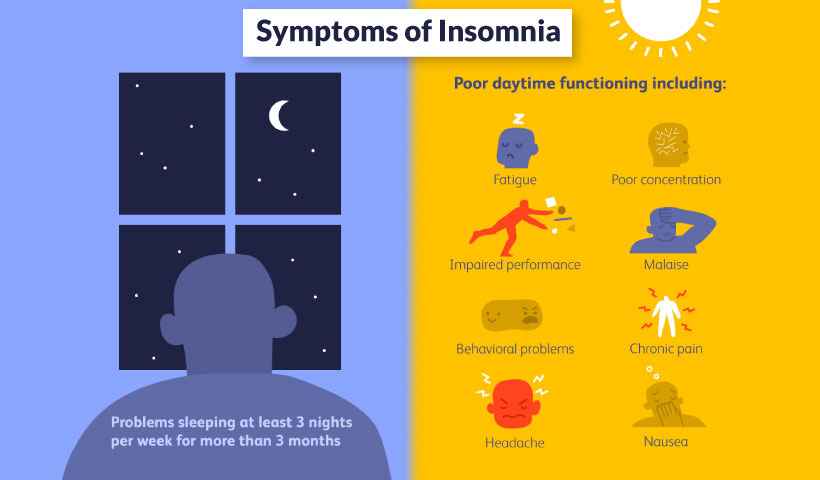
5. Daytime Fatigue: Insomnia can result in feelings of tiredness, exhaustion, and lack of energy throughout the day, which can impact concentration, mood, and overall functioning.
6. Impaired Concentration and Memory: Due to inadequate sleep, individuals with insomnia may experience difficulty concentrating, focusing, and remembering things.
7. Irritability and Mood Disturbances: Insomnia is often associated with irritability, mood swings, increased stress, and feelings of anxiety or depression.
8. Daytime Sleepiness: Chronic insomnia can lead to excessive daytime sleepiness, which can be dangerous if it interferes with activities that require alertness, such as driving.
9. Increased Wakefulness at Night: People with insomnia might find themselves more awake and alert during the nighttime hours, even when they should be naturally feeling sleepy.
10. Dependence on Sleep Aids: In some cases, individuals with insomnia might resort to using over-the-counter or prescription sleep aids to help them fall asleep, but this can lead to dependency and not address the underlying issues causing insomnia.
It's important to note that acute insomnia, which lasts for a short period and is often triggered by specific life events or stressors, can sometimes resolve on its own. However, chronic insomnia, lasting for three or more nights per week for at least three months, typically requires professional evaluation and treatment.
Insomnia Treatment
There are various approaches to treating insomnia, ranging from lifestyle changes to medical interventions. Here are some strategies and treatments that can help:
1. Lifestyle Changes:
o Sleep Hygiene: Maintain a consistent sleep schedule, create a comfortable sleep environment, and avoid stimulating activities before bedtime.
o Limit Stimulants: Reduce or avoid caffeine, nicotine, and alcohol, especially in the hours leading up to bedtime.
o Regular Exercise: Engage in regular physical activity, but avoid intense exercise close to bedtime.
o Diet: Eat a balanced diet and avoid heavy meals close to bedtime.
o Stress Management: Practice relaxation techniques such as deep breathing, meditation, or yoga to manage stress and anxiety.
2. Cognitive Behavioral Therapy for Insomnia (CBT-I):
CBT-I is a proven effective treatment for insomnia and involves identifying and changing negative thought patterns and behaviors related to sleep. It includes techniques like stimulus control, sleep restriction, relaxation training, and cognitive restructuring.
3. Medications:
Prescription Medications: In some cases, doctors may prescribe medications such as sedative-hypnotics or sleep aids. These should only be used under medical supervision and for a short duration, as they can have side effects and the potential for dependency.
Over-the-Counter (OTC) Medications: Some OTC sleep aids contain antihistamines that may help with short-term insomnia, but they should also be used with caution and only as directed.
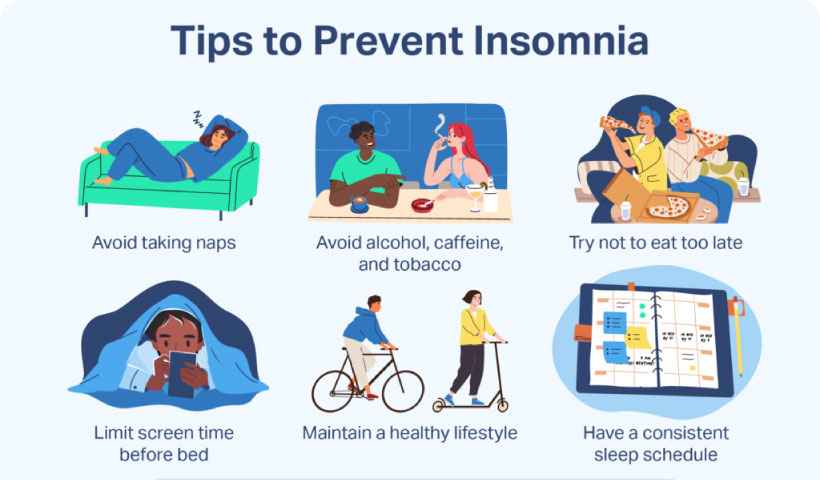
4. Alternative Therapies:
Melatonin: Melatonin is a hormone that helps regulate sleep-wake cycles. It's available as a supplement and may be helpful for adjusting sleep patterns.
Herbal Supplements: Some herbal supplements like valerian root, chamomile, and lavender are believed to have sleep-inducing properties, but research on their effectiveness is limited.
5. Light Therapy:
Light therapy involves exposure to bright light, usually in the morning, to help regulate your body's internal clock and improve sleep-wake patterns. This can be particularly useful for those with circadian rhythm disorders.
6. Professional Help:
If insomnia persists despite trying various strategies, it's important to consult a healthcare professional. A doctor or sleep specialist can help diagnose the underlying cause of your insomnia and recommend appropriate treatment options.
Remember that the effectiveness of these treatments can vary from person to person. It's advisable to consult a healthcare professional before making significant changes to your sleep habits or starting any new treatments. They can provide personalized guidance based on your individual situation and needs.

